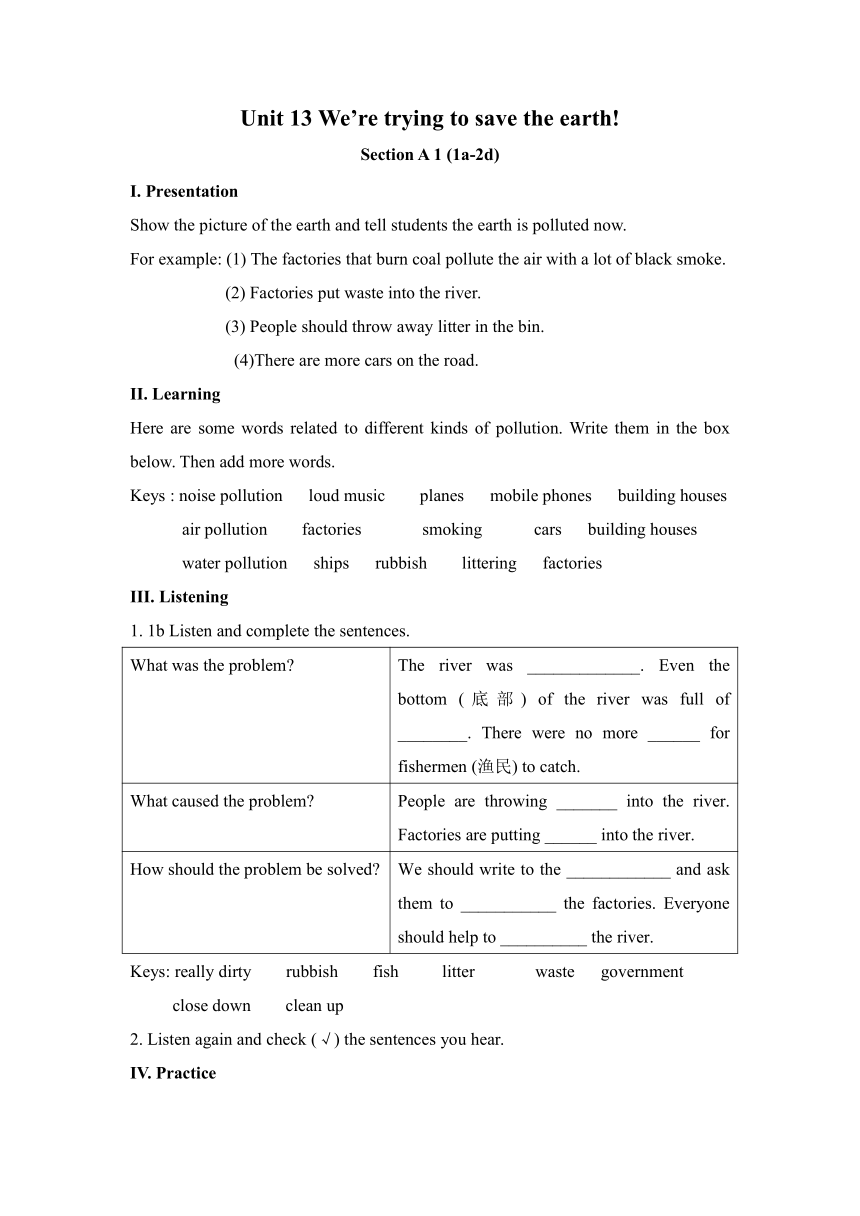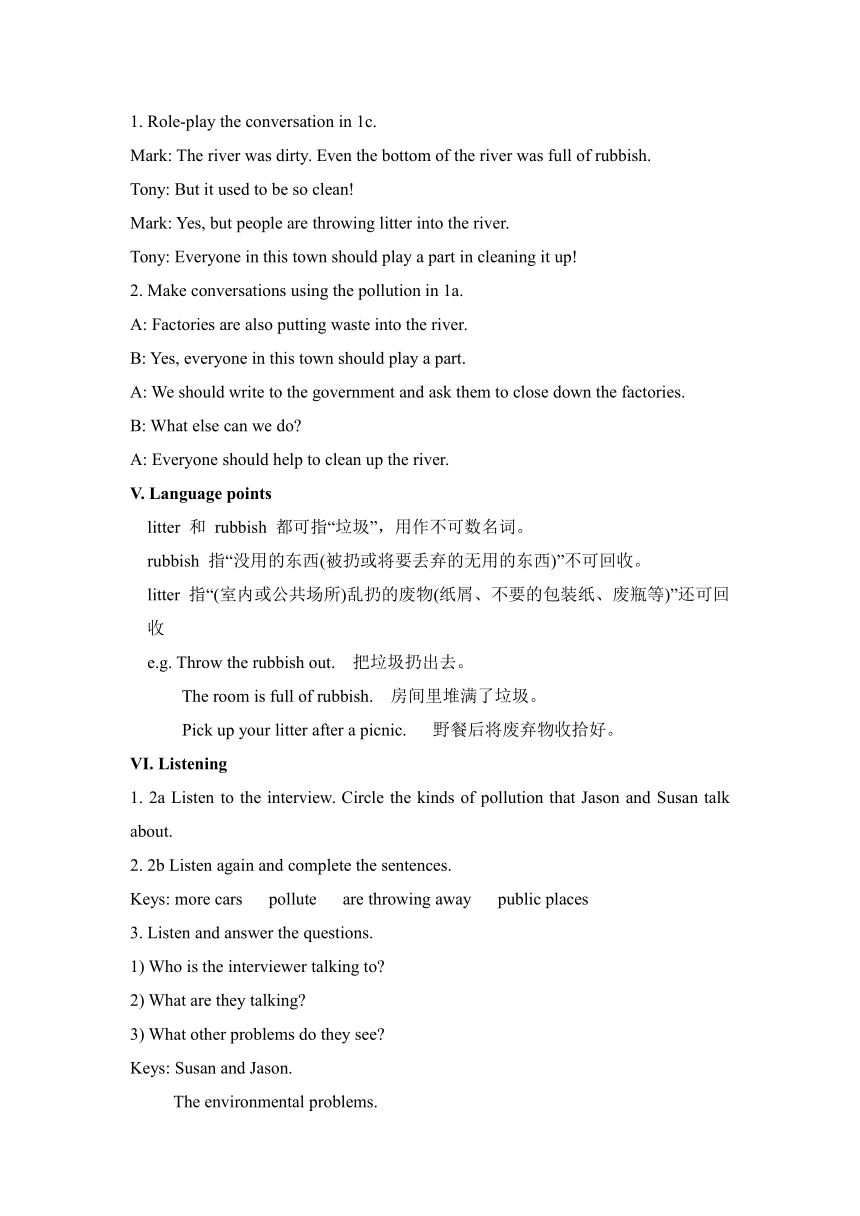人教版九年级全册英语 Unit13 We're trying to save the earth! SectionA 1a-2d 教案
文档属性
| 名称 | 人教版九年级全册英语 Unit13 We're trying to save the earth! SectionA 1a-2d 教案 |  | |
| 格式 | doc | ||
| 文件大小 | 41.0KB | ||
| 资源类型 | 教案 | ||
| 版本资源 | 人教新目标(Go for it)版 | ||
| 科目 | 英语 | ||
| 更新时间 | 2023-01-07 21:35:13 | ||
图片预览


文档简介
Unit 13 We’re trying to save the earth!
Section A 1 (1a-2d)
I. Presentation
Show the picture of the earth and tell students the earth is polluted now.
For example: (1) The factories that burn coal pollute the air with a lot of black smoke.
(2) Factories put waste into the river.
(3) People should throw away litter in the bin.
(4)There are more cars on the road.
II. Learning
Here are some words related to different kinds of pollution. Write them in the box below. Then add more words.
Keys : noise pollution loud music planes mobile phones building houses
air pollution factories smoking cars building houses
water pollution ships rubbish littering factories
III. Listening
1. 1b Listen and complete the sentences.
What was the problem The river was _____________. Even the bottom (底部) of the river was full of ________. There were no more ______ for fishermen (渔民) to catch.
What caused the problem People are throwing _______ into the river. Factories are putting ______ into the river.
How should the problem be solved We should write to the ____________ and ask them to ___________ the factories. Everyone should help to __________ the river.
Keys: really dirty rubbish fish litter waste government
close down clean up
2. Listen again and check (√) the sentences you hear.
IV. Practice
1. Role-play the conversation in 1c.
Mark: The river was dirty. Even the bottom of the river was full of rubbish.
Tony: But it used to be so clean!
Mark: Yes, but people are throwing litter into the river.
Tony: Everyone in this town should play a part in cleaning it up!
2. Make conversations using the pollution in 1a.
A: Factories are also putting waste into the river.
B: Yes, everyone in this town should play a part.
A: We should write to the government and ask them to close down the factories.
B: What else can we do
A: Everyone should help to clean up the river.
V. Language points
litter 和 rubbish 都可指“垃圾”,用作不可数名词。
rubbish 指“没用的东西(被扔或将要丢弃的无用的东西)”不可回收。
litter 指“(室内或公共场所)乱扔的废物(纸屑、不要的包装纸、废瓶等)”还可回收
e.g. Throw the rubbish out. 把垃圾扔出去。
The room is full of rubbish. 房间里堆满了垃圾。
Pick up your litter after a picnic. 野餐后将废弃物收拾好。
VI. Listening
1. 2a Listen to the interview. Circle the kinds of pollution that Jason and Susan talk about.
2. 2b Listen again and complete the sentences.
Keys: more cars pollute are throwing away public places
3. Listen and answer the questions.
1) Who is the interviewer talking to
2) What are they talking
3) What other problems do they see
Keys: Susan and Jason.
The environmental problems.
There’s too much rubbish and waste in the streets.
VII. Practice (2c)
Use the information in 2a and 2b to role-play conversations between Jason and Susan.
Jason: The air has become really polluted around here. I’m getting very worried.
Susan: Yes, I used to be able to see stars in the sky.
Jason: The problem is that…
VIII. Discussion
Ask students what we should do to save the earth. Help students answer, turn off the
lights when you leave a room; stop riding in cars; stop using paper towels or napkins; recycle books and paper.
IX. Reading
1. Read 2d and complete the chart.
Problems Solving problems
air pollution
waste pollution
wooden (木头的) chopsticks or plastic forks
rubbish
2. Role-play the conversation.
X. Summary and language points
1. This is turning beautiful places into ugly ones.
turn… into… 把……变成……
e.g. The icy rain seemed like to turn into snow.
渐渐地冻雨又变成雪花的模样。
2. It’s good for health and it doesn’t cost anything!
cost v. 花费;使付出
指花费金钱,主语通常是物。cost的过去式和过去分词均为cost。
e.g. The new shirt cost Mr Wang 200 yuan. 王先生花了200元买了新衬衫。
How much does the new computer cost 新电脑花了多少钱?
take, spend, pay & cost
take,spend,pay和cost都可以表示“花费”,但它们的用法各有不同。
1) take多表示花费时间,常用于It takes sb. some time to do sth.这一句型中,其中it作形式主语。
e.g. It usually takes me 40 minutes to cook the dinner.
2) spend多表示花费时间和金钱,主语通常是人,常用于sb. spend(s) some time / money on sth.和sb. spend(s) some time / money (in) doing sth.两种句型。
e.g. David spent 2,000 yuan on the new machine.
My father spends an hour (in) watching the news on TV every day.
3) pay多表示花费金钱,主语通常是人,常用于sb. pay(s) some money for sth.句型。
e.g. Tommy paid 20 yuan for his breakfast yesterday.
4) cost多表示花费金钱,主语通常是物,常用于sth. cost(s) (sb.) some money. 句型。
e.g. The new dress cost Linda 88 yuan.
XI. Exercises
用动词的适当形式填空。
1) We’re trying _______ (save) the earth.
2) There used to_____ (be) clean and beautiful.
3) There are too many ______ for ________to catch (fish).
4) It’s bad for environment to use _________ (wood) chopsticks.
Keys: to save be fish fishermen wooden
XII. Think about
The earth is badly polluted. Please make a poster and think of what we can do.
Section A 1 (1a-2d)
I. Presentation
Show the picture of the earth and tell students the earth is polluted now.
For example: (1) The factories that burn coal pollute the air with a lot of black smoke.
(2) Factories put waste into the river.
(3) People should throw away litter in the bin.
(4)There are more cars on the road.
II. Learning
Here are some words related to different kinds of pollution. Write them in the box below. Then add more words.
Keys : noise pollution loud music planes mobile phones building houses
air pollution factories smoking cars building houses
water pollution ships rubbish littering factories
III. Listening
1. 1b Listen and complete the sentences.
What was the problem The river was _____________. Even the bottom (底部) of the river was full of ________. There were no more ______ for fishermen (渔民) to catch.
What caused the problem People are throwing _______ into the river. Factories are putting ______ into the river.
How should the problem be solved We should write to the ____________ and ask them to ___________ the factories. Everyone should help to __________ the river.
Keys: really dirty rubbish fish litter waste government
close down clean up
2. Listen again and check (√) the sentences you hear.
IV. Practice
1. Role-play the conversation in 1c.
Mark: The river was dirty. Even the bottom of the river was full of rubbish.
Tony: But it used to be so clean!
Mark: Yes, but people are throwing litter into the river.
Tony: Everyone in this town should play a part in cleaning it up!
2. Make conversations using the pollution in 1a.
A: Factories are also putting waste into the river.
B: Yes, everyone in this town should play a part.
A: We should write to the government and ask them to close down the factories.
B: What else can we do
A: Everyone should help to clean up the river.
V. Language points
litter 和 rubbish 都可指“垃圾”,用作不可数名词。
rubbish 指“没用的东西(被扔或将要丢弃的无用的东西)”不可回收。
litter 指“(室内或公共场所)乱扔的废物(纸屑、不要的包装纸、废瓶等)”还可回收
e.g. Throw the rubbish out. 把垃圾扔出去。
The room is full of rubbish. 房间里堆满了垃圾。
Pick up your litter after a picnic. 野餐后将废弃物收拾好。
VI. Listening
1. 2a Listen to the interview. Circle the kinds of pollution that Jason and Susan talk about.
2. 2b Listen again and complete the sentences.
Keys: more cars pollute are throwing away public places
3. Listen and answer the questions.
1) Who is the interviewer talking to
2) What are they talking
3) What other problems do they see
Keys: Susan and Jason.
The environmental problems.
There’s too much rubbish and waste in the streets.
VII. Practice (2c)
Use the information in 2a and 2b to role-play conversations between Jason and Susan.
Jason: The air has become really polluted around here. I’m getting very worried.
Susan: Yes, I used to be able to see stars in the sky.
Jason: The problem is that…
VIII. Discussion
Ask students what we should do to save the earth. Help students answer, turn off the
lights when you leave a room; stop riding in cars; stop using paper towels or napkins; recycle books and paper.
IX. Reading
1. Read 2d and complete the chart.
Problems Solving problems
air pollution
waste pollution
wooden (木头的) chopsticks or plastic forks
rubbish
2. Role-play the conversation.
X. Summary and language points
1. This is turning beautiful places into ugly ones.
turn… into… 把……变成……
e.g. The icy rain seemed like to turn into snow.
渐渐地冻雨又变成雪花的模样。
2. It’s good for health and it doesn’t cost anything!
cost v. 花费;使付出
指花费金钱,主语通常是物。cost的过去式和过去分词均为cost。
e.g. The new shirt cost Mr Wang 200 yuan. 王先生花了200元买了新衬衫。
How much does the new computer cost 新电脑花了多少钱?
take, spend, pay & cost
take,spend,pay和cost都可以表示“花费”,但它们的用法各有不同。
1) take多表示花费时间,常用于It takes sb. some time to do sth.这一句型中,其中it作形式主语。
e.g. It usually takes me 40 minutes to cook the dinner.
2) spend多表示花费时间和金钱,主语通常是人,常用于sb. spend(s) some time / money on sth.和sb. spend(s) some time / money (in) doing sth.两种句型。
e.g. David spent 2,000 yuan on the new machine.
My father spends an hour (in) watching the news on TV every day.
3) pay多表示花费金钱,主语通常是人,常用于sb. pay(s) some money for sth.句型。
e.g. Tommy paid 20 yuan for his breakfast yesterday.
4) cost多表示花费金钱,主语通常是物,常用于sth. cost(s) (sb.) some money. 句型。
e.g. The new dress cost Linda 88 yuan.
XI. Exercises
用动词的适当形式填空。
1) We’re trying _______ (save) the earth.
2) There used to_____ (be) clean and beautiful.
3) There are too many ______ for ________to catch (fish).
4) It’s bad for environment to use _________ (wood) chopsticks.
Keys: to save be fish fishermen wooden
XII. Think about
The earth is badly polluted. Please make a poster and think of what we can do.
同课章节目录
- Unit 1 How can we become good learners.
- Section A
- Section B
- Unit 2 I think that mooncakes are delicious!
- Section A
- Section B
- Unit 3 Could you please tell me where the restroom
- Section A
- Section B
- Unit 4 I used to be afraid of the dark.
- Section A
- Section B
- Unit 5 What are the shirts made of?
- Section A
- Section B
- Review of Units 1-5
- Unit 6 When was it invented?
- Section A
- Section B
- Unit 7 Teenagers should be allowed to choose their
- Section A
- Section B
- Unit 8 It must belong to Carla.
- Section A
- Section B
- Unit 9 I like music that I can dance to.
- Section A
- Section B
- Unit 10 You're supposed to shake hands.
- Section A
- Section B
- Review of Units 6-10
- Unit 11 Sad movies make me cry.
- Section A
- Section B
- Unit 12 Life is full of the unexpected
- Section A
- Section B
- Unit 13 We're trying to save the earth!
- Section A
- Section B
- Unit 14 I remember meeting all of you in Grade 7.
- Section A
- Section B
- Review of Units 11-14
